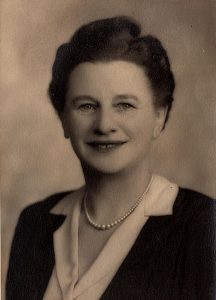submitted by Susan Hawthorne
I write about my grandmother all the time. Her second name was Millicent. We all called her Mill and for many years I thought her first name was Maytie. In fact, it was the far more German-sounding Mehta. My grandmother was born in the nineteenth century and her mother was German. Mill died when I was about six years old. So I knew my grandmother, I loved my grandmother intensely, and many years later my mother told me that I was her favourite. I wear my grandmother’s engagement ring as a connecting link to both my mother and my grandmother. 
My grandmother was a worldly woman. She had to be after serving as a nurse on a Red Cross ship during WWI. There she met my grandfather, a Scot from the island of Bute, and the ship’s captain. He died two decades before I was born.
My grandmother travelled a lot. During the short time of my childhood while she was alive she visited Germany, England and Japan. There were links to all these places. Her mother was German, which held some difficulty for Mill during WWI. I suspect it was at this time she stopped using Mehta as the sailors on the ship referred to her as ‘fraulein’. Tricky when the enemy is German. Mill also had a very good friend in Germany, whose name I no longer remember (it may have been Edith). The story I recall is that her friend looked after Mill at some point when Mill was laid up with illness. Every year we would receive Advent Calendars from Germany with the increasing excitement as Christmas Day approached.
I have a fold out postcard from her time in England, written to my older sister and me, so she must have been there around 1953, prior to the birth of my brother. Her sister Grace lived in London in Gracechurch Street.
Mill visited Japan after World War II. Her son, John, had been a Prisoner of War in Changi. I have sometimes wondered whether the families of former POWs were invited to Japan as a kind of reparation.
Shell (from Family Ties, edited by Jennifer Strauss, 1998)
My mother and I walk the back lanes of St Kilda
one sunny day in late October. Ghostly forms
like memories dart around us. This hotel,
where my grandmother lived throughout my childhood,
burnt down last year. Once grand it is now a shell.
From the lane I can see bathroom tiles dropping sheer
to the ground. My mother says, “The two Miss Hawthornes
lived on that side,” pointing to the edge that wings back
towards where we stand. “And Mill?” I say (for that’s
what we called her) “did she live at the front?” “Mostly,
yes.” “For how long?” My mother counts the years,
dropping out those not spent here. “About seven, altogether.”
“I remember my fifth birthday, I say, “the cane cradle
Auntie Aldyth gave me.” And we came again when Mill
returned from England. It was the front suite, had one room
with a large oak table, another where she slept. She brought
dolls, and I, as the youngest, had to choose first.
My biggest responsibility to date. I picked the one
with the prettiest dress. Later, as I grew older,
I thought my sister’s doll prettier. But on that day,
I was happy. Mill never left The Majestic. She died
in Fitzroy Street, hit by a tram. She’s still there.
I see her sometimes, wearing faded purple dresses
of grandmother hue, soft like irises. And I know that underneath
is a whalebone corset so huge, it would take three of me.
We buy a strawberry gelato at Joes, and I am remembering
the pink flesh, the pink fabric that spread between the hard ribs of
Jonah’s refuge. A link, perhaps, with my grandfather still
at sea. Today the tramlines stretch toward to sea,
and a hotel, once majestic, is a blackened shell.
from Valence (2011)
at the beginning of every year we ask whether
the killing spree is over for now all the soldiers
who heard earth’s tinnitus ringing on the frontline
fly home walk through the front gate
cannot explain what they have seen have heard
that there is no longer any grace in the world
in the houses where women keep time with days
over stoves where hunger is the taste of childhood
and thirst a close neighbour no one dares to speak
peace is a mirage a vision at the edge of thought
cities stagnate and are separated from the people
countries are divided like pieces of cake
few speak against revenge slit the veins open
let the blood run a long-fingered violinist
plays a spree of notes emergent gravity looping
as a new virus explodes crossing all the man-made
boundaries taking off on its very own killing spree
rampaging through the gutters into the glare of air
My grandmother worked as nurse on a Red Cross ship in World War One. I was thinking of all that she had seen, of the hopelessness of war wounds, of the hunger of children, and of the waiting. And then the discovery of what had happened in the trenches, the effect of mustard gas. Not only were the lines drawn in Europe, in that same period the precursor lines of the Middle Eastern Wars were drawn. A country is not a cake to be divided.
Australia: memory’s labyrinth from Lupa and Lamb (2014)
my grandmother’s needs were architectural
they arched stretched out over lawns
rose like great temple ceilings
they never lounged about ate chocolate
or wasted time in street-corner conversation
she was like a homestead with a return verandah
that looked out over paddocks
took in the whole landscape
and everyone who wandered or sped by
my grandmother was called ferocious
she took the world in her stride
insisted on respect and courtesy
gave a dressing down to the uncouth
on picnic race days she made sandwiches
not wanting to waste hours on competitive cooking
her bets were selected with determination
and she won more often than not
once she won at eighty to one
the bookie almost bankrupt
my grandmother perished as she had lived
the family waited for resurrection
not believing such a force of nature
could go so fast leaving nothing but dust
for the most part my grandmother is forgotten
except by the girl she told stories to
great architectural tales that wound through forests
took labyrinthine detours but always returned
to the space between them and silence
© Susan Hawthorne, 1998, 2011, 2014, 2018
